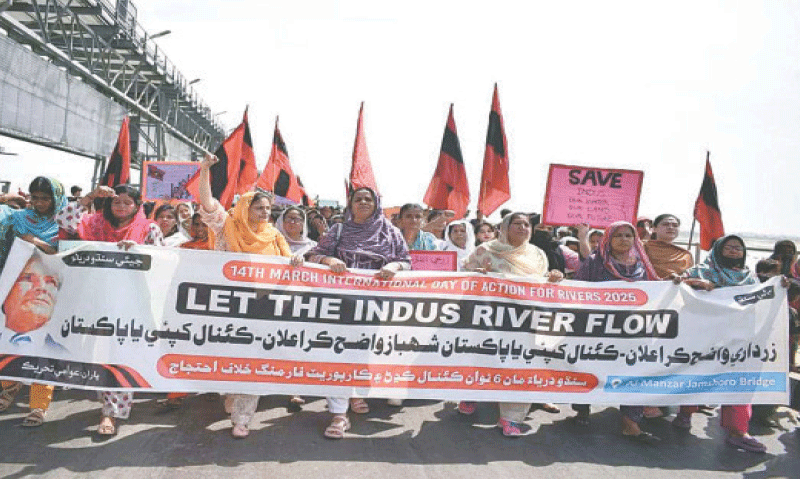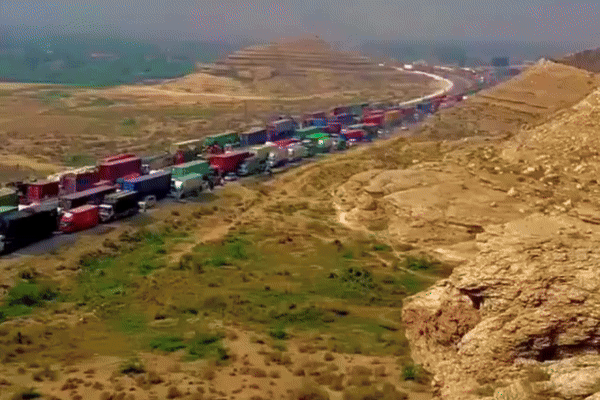Canal sit-in in Sindh enters day seven despite Pakistan govt assurances
Protesters demand a written cancellation of the controversial canal project as sit-in halts goods transport
Akhtiar Khokhar
Special Correspondent
Akhtiar Khokhar is a one of the karachi-based senior journalists. He has been doing investigative reporting for Pakistan's mainstream print and electronic media for the past 33 years, especially highlighting corruption and bad governance in government institutions and development projects.

A major protest on Pakistan’s National Highway entered its seventh day Friday, paralyzing the flow of goods from Sindh to Punjab and beyond, despite assurances from the country’s top leaders that no new canals will be built on the Indus River without provincial consensus.
The protest is being led by lawyers and nationalist groups near Baberlo in Pakistan’s southern province of Sindh. The protesters have rejected a joint statement by Prime Minister Shehbaz Sharif and Pakistan People’s Party (PPP) Chairman Bilawal Bhutto Zardari, demanding a formal, written cancellation of the proposed canal projects.
Following a high-level meeting between ruling coalition leaders in Islamabad, Prime Minister Sharif and PPP Chairman Bilawal held a joint press conference on Thursday. They said the government would not proceed with any new canal construction without approval from all provinces via the Council of Common Interests (CCI).
“The federal government has decided that no new canals will be built without mutual understanding from CCI,” said an official statement issued following the meeting. “The decision helped end the political infighting and uncertainty, which had gripped the country for several days.”
The government also pledged to form a federal-provincial committee to develop long-term strategies for agriculture and water management, citing the 1991 Water Apportionment Accord and the 2018 Water Policy as guiding frameworks.
A CCI meeting has been scheduled for May 2, where PML-N and PPP members are expected to endorse the policy and recommend returning the matter to the Indus River System Authority (IRSA).

Meanwhile, Sindh Chief Minister Murad Ali Shah, while addressing a press conference in Karachi earlier today, said a similar consensus-based process blocked the Kalabagh Dam years ago. “Just like no dam could be built without consensus, no new canal will be allowed without it,” he said.
He clarified that IRSA had merely issued a certificate and that only the CCI, not the Prime Minister, had the constitutional authority to revoke it.
“If the Prime Minister never issued a notification, how can he cancel it?” Shah added, urging protestors to trust the process.
Despite his outreach, the protest continues. Aamir Nawaz Warraich, President of the Karachi Bar Association and a protest leader, said demonstrators would not stand down without a written federal order.
“If force is used, resistance will spread to every street in Sindh,” he warned.
Sindh-based analyst Jami Chandio echoed the skepticism. “This isn’t cancellation, it’s postponement,” he said. Chandio criticized the planned federal committee, calling it a tool to reintroduce the canal project under a different guise.
He also challenged federal involvement in agriculture and water management, which are provincial matters under Pakistan’s Constitution. “Why are these provincial subjects being handed over to an extra-constitutional body?” he asked.
Chandio noted longstanding objections by Sindh to both the 1991 Accord and the 2018 Policy. “People here are demanding a permanent cancellation of the canal and withdrawal of land allocations for corporate farming,” he said.
The sit-in
The sit-in against a controversial federal canal project began on April 18 near Baberloi in Khairpur district of Sindh, and has since expanded to key points like Rohri and Ali Wahan, crippling trade routes and leaving approximately 20,000 goods and oil tankers stranded across the province.
Highway blockades organized by political and social groups, including the Karachi Bar Association and Sindh High Court Bar Association, have paralyzed commercial transport. The protesters are demanding a halt to the federal government’s plan to build six new canals from the Indus River.
The project, allegedly approved by President Asif Ali Zardari in July 2024, a claim he later denied, has sparked backlash in Sindh over concerns of water rights and provincial autonomy.
Daily movement of around 500 oil tankers from Karachi’s oil depot to Punjab and Khyber Pakhtunkhwa has stopped entirely. According to the Oil Companies Advisory Council (OCAC), some 800 tank lorries are now stuck in the Sukkur–Larkana region, raising the specter of fuel shortages.
- YouTube www.youtube.com
"Fuel stocks remain stable for now," the OCAC said in a letter to the Chief Secretary Sindh, "but without alternate routes, continued disruption will lead to shortages across the province."
The Karachi Chamber of Commerce & Industry (KCCI) also warned that the ongoing disruption is causing severe damage to the economy.
“The entire supply chain stands paralyzed due to the road closures,” said KCCI President Jawed Bilwani. “Containers and cargo vehicles are stuck in long queues, and time-sensitive shipments, especially perishable goods, are suffering major delays.”
Meanwhile, the Overseas Investors Chamber of Commerce and Industry (OICCI) voiced serious concerns over the financial toll of the protests, warning that continued disruption risks long-term damage to Pakistan’s economy and credibility as a trading partner.
“Uninterrupted trade is vital to safeguard export competitiveness and promote economic stability,” the OICCI said in a statement, urging immediate action from both provincial and federal authorities.
According to the chamber, more than 3,500 vehicles, many loaded with perishable goods, export consignments, and critical industrial inputs, remain stranded near Sukkur. The prolonged halt is already creating market shortages, with fears growing of production shutdowns in multiple provinces due to raw materials stuck at Karachi Port.
Controversial canal project
The federal government announced plans to construct six new canals, five on the Indus River and one on the Sutlej River. These are the Rainee Canal and Thar Canal in Sindh, the Kacchi Canal in Balochistan, the Chashma Right Bank Canal in Khyber Pakhtunkhwa, and the Cholistan Canal and Greater Thal Canal in Punjab.
Three of these canals, Rainee, Kacchi, and Chashma Right Bank, have been under construction since before General Pervez Musharraf’s era. Experts from Sindh had raised objections to them at that time as well. Now, these canals are part of the Pakistan Green Initiative, a program aimed at expanding corporate farming in the country.
Under the 1991 Indus River System water agreement, any new irrigation project requires approval from the Indus River System Authority (IRSA). On January 25, 2024, IRSA issued a water supply certificate for the construction of the Cholistan Canal. However, Sindh’s IRSA representative, Ehsan Lagari, opposed the decision.
Punjab has claimed that the Cholistan Canal will be fed from its water share. However, Sindh remains concerned that Punjab has not specified which areas will receive reduced water to compensate for the new canal. This raises fears that the water may ultimately be taken from Sindh’s share to irrigate the new lands of Cholistan, exacerbating the already tense situation.
Experts from Sindh warn that the construction of Cholistan Canal will result in reduced water flow to the sea, which will have devastating consequences for the province.







Comments
See what people are discussing